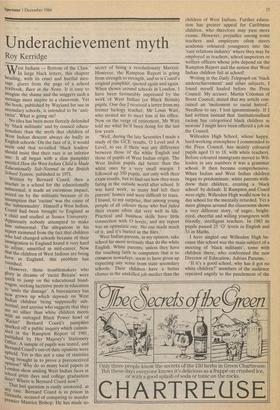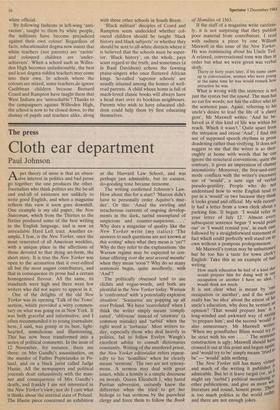Underachievement myth
Roy Kerridge
West Indians — Bottom of the Class.' In large black letters, this chapter heading, with its cruel and hurtful mes- sage, glares from the page of a school textbook, Race in the News. It is easy to imagine the shame and the sniggers such a message must inspire in a classroom. Yet the book, published by Wayland for use in secondary schools, is intended to be 'anti- racist'. What is going on? No idea has been more fiercely defended by 'black militants' and by council educa- tionalists than the myth that children of West Indian descent always do badly in English schools. On the face of it, it would seem odd that so-called 'black leaders' should insist that their race is an inferior One It all began with a slim pamphlet entitled How the West Indian Child is Made Educationally Sub-Normal in the British School System, published in 1971. Written by Bernard Coard, then a teacher in a school for the educationally subnormal, it made an enormous impact, seized on by the militants because of its assumption that 'racism' was the cause of the 'subnormality'. Himself a West. Indian, Coard had been brought to England as a child and studied at Sussex University. AJParently nobody attempted to make nun subnormal. The allegations in his report stemmed from the fact that children who had changed schools because of their immigration to England found it very hard to adjust, unsettled in mid-career. Now that the children of West Indians are being born in England, this problem has vanished.
However, those troublemakers who glory in dreams of 'racist Britain' were quick to jump on the educational band- wagon, seeking lucrative posts in education to 'undo the damage'. A bureaucracy has now grown up which depends on West Indian children being supposedly sub- normal, and anyone who suggests that they are no sillier than white children meets With th an outraged Black Power howl of Racist!' Bernard Coard's pamphlet sParked off a public inquiry which culmin- ated in the Rampton Report of 1981, Published by Her Majesty's Stationery office. A sample of pupils was tested, and Bernard Coard's out-of-date opinions were ruPheld. Yet is this not a case of statistics being brought in to prove a preconceived opinion? Why do so many local papers in London show smiling West Indian faces at school prize days and college graduation days? Where is Bernard Coard now? That last question is easily answered, at !...nY rate. Bernard Coard is in prison in Grenada, accused of conspiring to murder Premier Maurice Bishop. He has made no secret of being a revolutionary Marxist. However, the Rampton Report is going from strength to strength, and so is Coard's original pamphlet, quoted again and again. When shown around schools in London, I have been favourably impressed by the work of West Indian (or Black British) pupils. One day I received a letter from my former biology'teacher, Mr Louis Watt, who invited me to meet him at his office. Now on the verge of retirement, Mr Watt told me what he'd been doing for the last few years.
`Well, during the late Seventies I made a study of the GCE results, 0 Level and A Level, to see if there was any difference between those of the white English and those of pupils of West Indian origin. The West Indian pupils did better than the white ones by a very small margin. I followed up 350 pupils, not only with their exam results, but to find out how they were faring in the outside world after school. It was hard work, as many had left their parents' homes and were difficult to trace. I found, to my surprise, that among young people of all colours those who had failed their exams often did very well in life. Practical and business skills have little connection with 0 levels, and my report was an optimistic one. No one made much of it, and it's buried in the files.'
West Indian parents, in my opinion, take school far more seriously than do the white English. White parents, unless they have the touching faith in computers that is so common nowadays, seem to have given up expecting any sense from state secondary schools. Their children have a better chance in the unskilled job market than the children of West Indians. Further educa- tion has greater appeal for Caribbean children, who therefore may pass more exams. However, prejudice among some teachers and employers often steers academic coloured youngsters into the `race relations industry' where they may be employed as teachers, school inspectors or welfare officers whose jobs depend on the Rampton Report and the notion that West Indian children fail at school!
Writing in the Daily Telegraph on 'black underachievement' and other subjects, I found myself hauled before the Press Council. My accuser, Martin Coleman of Brent Council, stated that my article con- tained an 'incitement to racial hatred'. Needless to say, I lost ignominiously. If I had written instead that 'institutionalised racism 'has categorised black children as morons' I might have been offered a job on the Council.
Willesden High School, whose happy, hard-working atmosphere I commended to the Press Council, has mainly coloured pupils aged 11 to 18, with white teachers. Before coloured immigrants moved to Wil- lesden in any numbers it was a grammar school. It then became comprehensive. When Indian and West Indian children began to predominate, white parents with- drew their children, creating a 'black school' by default. If Rampton andCoard were right, Willesden High would now be a day school for the mentally retarded. Yet a mere glimpse around the classrooms shows a very different story, of eager, bright- eyed, cheerful and willing youngsters with friendly, intelligent teachers. In 1983 its pupils passed 25 '0' levels in English and 53 in Maths.
I have singled out Willesden High be- cause this school was the main subject of a meeting of 'black militants', some with children there, who confronted the new Director of Education, Adrian Parsons.
'If it's a good school, why has it got no white children?' members of the audience repeated angrily to the puzzlement of the white official.
By following fashions in left-wing 'anti- racism', taught to them by white people, the militants have become prejudiced against their own colour! Regardless of facts, educationalist dogma now insists that white teachers (not parents) are 'racists' and coloured children are 'under- achievers'. When a school such as Willes- den High becomes unfashionable, the best and least dogma-ridden teachers may come into their own. In schools where the colours are mixed, some teachers do ignore Caribbean children because Bernard Coard and Rampton have taught them that West Indians are 'unteachable'! Thanks to the campaigners against Willesden High, the school is now to be closed down, to the dismay of pupils and teachers alike, along
with three other schools in South Brent.
'Black militant' disciples of Coard and Rampton seem undecided whether col- oured children should be taught 'black history and black subjects' or whether they should be sent to all-white districts where it is believed that the schools must be super- ior. 'Black history', on the whole, pays scant regard to the truth, and sometimes
la Basil Davidson) echoes the fawning praise-singers who once flattered African kings. So-called 'superior schools' are usually situated among the homes of well- read parents. A child whose home is full of much-loved classic books will always have a head start over its bookless neighbours. Parents who wish to have educated chil- dren could help them by first educating themselves.























































 Previous page
Previous page